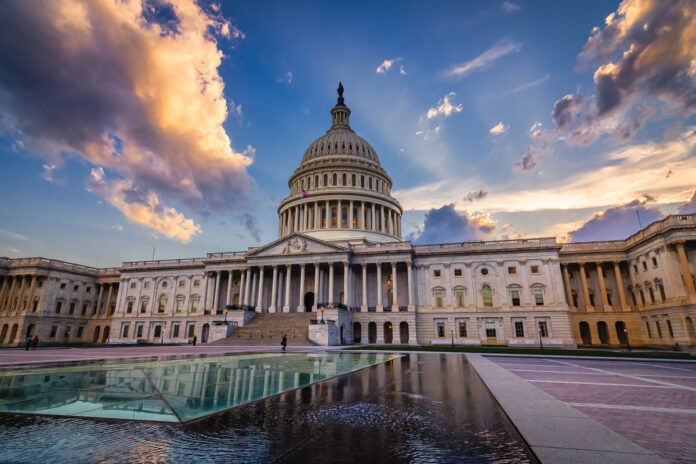
Policymakers in Washington are keenly focused on ways to address the nation’s affordable housing supply shortage. The need for immediate solutions is only increasing — in 2021, home prices increased by more than 18% while “real” average weekly earnings for U.S. workers fell by more than 3%. With housing inventory at near historic lows and economists estimating more than five million homes are needed, finding ways the federal government can help spur additional affordable housing supply is at the top of the agenda. The Manufactured Housing Institute is working to ensure manufactured housing is well-positioned to be at the forefront of these deliberations.
Talk of Manufactured Housing at the Capitol
Last September, the Biden-Harris administration directed federal agencies to use “every tool available in government to produce more affordable housing supply as quickly as possible.” Manufactured housing supply was a leading component of this effort, with White House Press Secretary Jen Psaki highlighting the administration’s commitment to boosting the supply of manufactured housing. Beyond Washington, the plan included calling on state and local governments to reduce zoning and financing barriers to manufactured housing which “allows families to achieve homeownership and build wealth.”
This is a historic time for our industry when our efforts in Washington continue to yield attention at the highest levels of government to help more Americans achieve homeownership through manufactured housing. As a result of the White House directive, an inter-agency task force has been convened to look at federal homeownership financing programs and how they can better support the purchase of manufactured homes.
With current HUD Secretary Marcia Fudge pledging her support of manufactured housing at numerous congressional hearings, saying it is an “outstanding option,” MHI’s efforts to educate policymakers has positioned us to ensure federal efforts to increase the affordable housing supply in America will include changes in policy that support manufactured housing. In addition, to support by administration officials, MHI has worked to ensure that the benefits of manufactured housing are a topic at every affordable housing hearing that has taken place in the 117th Congress.
We are not just cultivating relationships with those congressional representatives that already know us.. We are taking our message about the quality and affordability of manufactured homes to congressional leaders, including many who have never seen a manufactured home but want more quality affordable homeownership options in their districts. Our efforts have yielded results and through our advocacy, we have support from congressional members on both sides of the aisle and from all parts of the country – saying at hearings that manufactured housing is “the most affordable homeownership option available nationwide” and “manufactured housing offers a safe and affordable, wonderful, place for a family to call home.”
Seize the Opportunity
Now is our time, and MHI is seizing the opportunity to advance key priorities to grow the market, including ensuring federal housing finance programs (FHA, Fannie Mae, Freddie Mac, USDA, VA) support manufactured housing; updating the HUD Code on a regular cadence; making sure efforts to increase energy efficiency standards for manufactured housing are feasible and cost-effective; moving the federal government to address local exclusionary zoning policies and enforce the preemption of the HUD Code; and supporting the preservation of land-lease communities.
In addition to our direct work with federal policymakers, MHI’s membership has served as a key grassroots connection to elected representatives and regulators. Since the beginning of the 117th Congress and the Biden Administration, we have generated more than 1,500 contacts to the administration and Congress. Our advocacy has resulted in the first update to the FHA Title I program in 40 years; the first comprehensive updates to the HUD Code in decades; the Senate telling HUD to expedite further updates to the HUD Code and further FHA financing reforms; House members telling the Department of Energy they do not support the proposed efficiency rule; and administration efforts to address lumber prices and supply chain shortages. MHI is also developing partnerships with key national housing and business coalitions to ensure industry priorities are embraced by the advocacy community so that our voice to policymakers is even stronger. Through these relationships, MHI has participated in numerous housing industry events, including the National Association of Realtors® December “Real Estate Forecast Summit: The Year Ahead.”
Build for the Future
MHI is continuing to build upon our momentum from 2021 so that we can continue to elevate housing innovation and expand attainable homeownership. We will continue to build relationships with federal policymakers and ensure the manufactured housing industry continues to be a part of the federal dialogue about addressing our nation’s housing challenges. Our access to Washington policymakers is as strong as ever and it is bolstered by the direct engagement from MHI members to their elected representatives to keep our issues at the forefront.
In addition to advocacy, we are committed to supporting our members with quality events, education, and information. Our upcoming in-person conferences will be packed with exceptional programming and networking opportunities. In addition, we are growing our resources for members, ranging from useful economic reports to interactive maps on topics like zoning and manufactured housing communities, to timely news and updates. MHI continues to gain momentum in Washington, not only due to our effective advocacy strategy but because of what is happening in the industry – the quality of our houses and our people. Together, with a strong voice and unified message, we will ensure federal policymakers support our industry’s growth so that the American Dream of homeownership can be a reality for more Americans.










